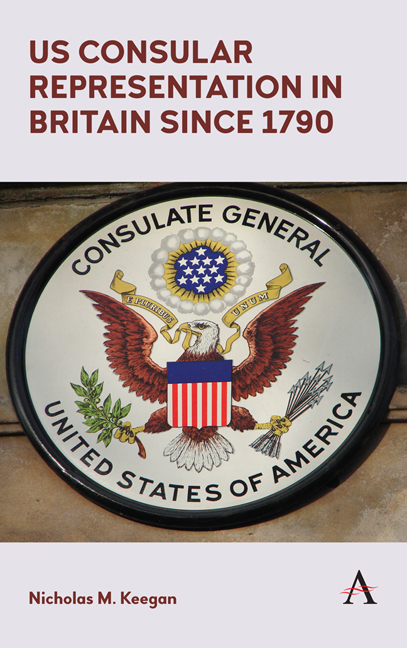Book contents
- Frontmatter
- Dedication
- Contents
- List of Illustrations
- Foreword
- Preface
- Acknowledgements
- Introduction
- PART 1
- PART 2
- PART 3
- Chapter Six Consular Posts and Consular Agencies in Major Cities
- Chapter Seven Belfast
- Chapter Eight Birmingham
- Chapter Nine Bradford
- Chapter Ten Bristol
- Chapter Eleven Cardiff
- Chapter Twelve Dublin
- Chapter Thirteen Dundee
- Chapter Fourteen Dunfermline
- Chapter Fifteen Edinburgh and Leith
- Chapter Sixteen Falmouth
- Chapter Seventeen Liverpool
- Chapter Eighteen London
- Chapter Nineteen Newcastle upon Tyne
- Chapter Twenty Southampton
- Chapter Twenty-One Stoke on Trent
- Chapter Twenty-Two An Evolving, Adaptive Service
- Appendix: Locations and Categories of Consular Offices
- Notes
- Sources
- Bibliography
- Index
Chapter Seven - Belfast
from PART 3
Published online by Cambridge University Press: 21 June 2018
- Frontmatter
- Dedication
- Contents
- List of Illustrations
- Foreword
- Preface
- Acknowledgements
- Introduction
- PART 1
- PART 2
- PART 3
- Chapter Six Consular Posts and Consular Agencies in Major Cities
- Chapter Seven Belfast
- Chapter Eight Birmingham
- Chapter Nine Bradford
- Chapter Ten Bristol
- Chapter Eleven Cardiff
- Chapter Twelve Dublin
- Chapter Thirteen Dundee
- Chapter Fourteen Dunfermline
- Chapter Fifteen Edinburgh and Leith
- Chapter Sixteen Falmouth
- Chapter Seventeen Liverpool
- Chapter Eighteen London
- Chapter Nineteen Newcastle upon Tyne
- Chapter Twenty Southampton
- Chapter Twenty-One Stoke on Trent
- Chapter Twenty-Two An Evolving, Adaptive Service
- Appendix: Locations and Categories of Consular Offices
- Notes
- Sources
- Bibliography
- Index
Summary
Ireland was part of Great Britain until 1922 when it became the Irish Free State, a dominion within the British Commonwealth. The United States opened its first consulate in Ireland in Dublin in 1790 and six years later it opened another in the north of the island, in Belfast. While the Dublin consul was an American, the Belfast one was British – James Holmes, a local merchant who served for almost twenty years until 1815 when he was succeeded by James Luke, another local businessman. It was not until 1830 that an American, Thomas W. Gilpin of Philadelphia, was appointed. He served until 1842 and had a second appointment from 1845 until 1847. Also in 1830, the first consular office in Londonderry was opened, headed by Thomas Davenport as vice consul. Between then and 1920 the Belfast and Londonderry offices were variously consulates, vice consulates and consular agencies. There were also other consular offices between 1842 and 1908 in Newry, Ballymena, Sligo and Lurgan, which were subordinate to Belfast and Londonderry. In the southern part of the island there were consular offices at various times, sometimes for only short periods, in Athlone, Ballina, Cobh, Cork, Crookhaven, Dundalk, Galway, Kingstown, Limerick, Waterford and Wexford.
Belfast was a busy consulate and the total value of goods exported to America from its district during 1871 and the first quarter of 1872 exceeded £2.5 million, or almost $11 million, and the consulate earned almost $16,000 in fees from certifying these goods. The goods were not shipped direct to America but via Liverpool. The consulate had only one subordinate agency, at Ballymena. In 1881 the consulate moved premises to 5 Donegal Square, and the following year it established an additional agency at Lurgan. In 1885 George Washington Savage, born in New York, was appointed, and nominated his son John Marbacher Savage as his vice consul. Both would later serve in Dundee. Savage was succeeded by Samuel Ruby (1889– 1893) and James B. Taney (1893– 1896). In 1896, Taney appointed Malcolm T. Brice as his vice and deputy consul. Brice was also an American citizen, a native of West Virginia, who after graduation at the Linsly Military Academy in 1893 had gone to Belfast to attend art school in 1894 and then entered the consulate as clerk the following year.
- Type
- Chapter
- Information
- US Consular Representation in Britain since 1790 , pp. 95 - 100Publisher: Anthem PressPrint publication year: 2018

